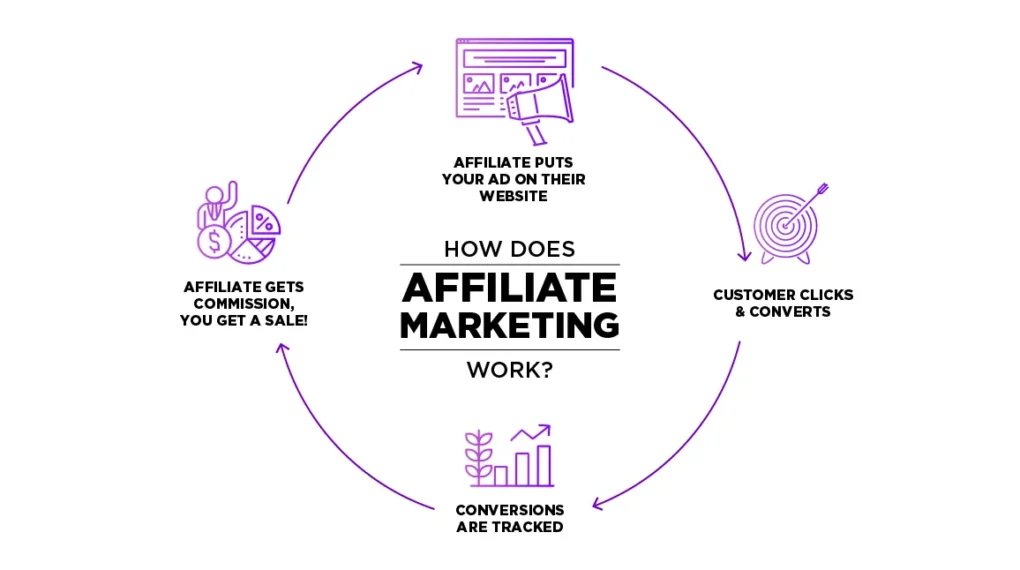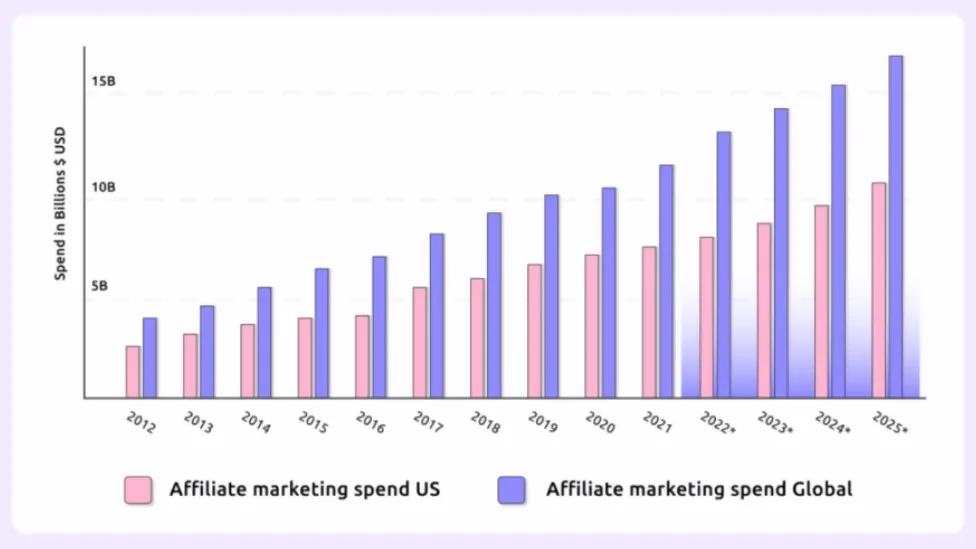In the digital age, affiliate marketing has emerged as a beacon of opportunity for entrepreneurs and content creators alike. As we navigate through 2024, the question on many minds is: Is affiliate marketing still worth it? The answer is a resounding yes, and here's why.
Affiliate marketing is a performance-based venture where you, as an affiliate, earn commissions by promoting a company's products or services. It's a symbiotic relationship where businesses gain exposure and sales, while affiliates receive a share of the profits for their marketing efforts.
When is Affiliate Marketing Worth it?
Affiliate marketing is worth it when you approach it strategically and select the right partnerships. It can be a lucrative revenue stream, but success depends on several factors:
- Affiliate Commission Structure: Look for affiliate programs with a commission structure that aligns with your content and audience. Higher commissions can lead to more income, but the relevance of the product to your audience is crucial
- Relevance and Quality of Products or Services: Promote products or services that are relevant and useful to your audience. High-quality content that entertains, informs, or educates your audience about these products can lead to better conversion rates
- Trustworthy Partnerships: Ensure you're entering into affiliate partnerships with transparent and consistent companies. They should be upfront about the terms and conditions of their referral program and provide clear dashboards and reporting for tracking your success
- Patience and Persistence: Affiliate revenue often builds up over time. It's important to be patient and continually test different programs to find the ones that convert best and earn you the most money
- Market Demand: Affiliate marketing is more effective when there's a demand for the products or services you're promoting. It's estimated that affiliate marketing is responsible for more than 15% of e-commerce sales, indicating a strong market
- Diversification: Create a variety of ads and use different marketing channels to promote your affiliate products. This can help you stand out from the competition and find the most effective strategies for your audience
- Net Profit Considerations: When evaluating the success of affiliate marketing, focus on net profit rather than just revenue. Net profit is your take-home amount after expenses, which gives a more accurate picture of your earnings
- Strategic Promotion: Use affiliate marketing strategies that align with your brand and audience. This includes selecting the right affiliates, using affiliate marketing software for tracking, and diversifying your affiliate programs
- Understanding Your Audience: Knowing your audience's needs and preferences is key to choosing the right affiliate programs. Promote products that address their desires and solve their problems
- SEO and Content Quality: Incorporate SEO best practices and create high-quality content to attract the right audience and improve conversion rates
Affiliate marketing is worth it if you're willing to invest time in creating quality content, choosing the right partners, and employing effective marketing strategies. While not every affiliate marketer makes a significant income, with the right approach, it's possible to earn a substantial amount through affiliate marketing.
How Does Affiliate Marketing Work?

Affiliate marketing is a performance-based advertising model where an affiliate earns a commission for marketing another person's or company's products or services. The affiliate simply searches for a product they enjoy, promotes that product, and earns a piece of the profit from each sale they make. The sales are tracked via affiliate links from one website to another
Here's a step-by-step breakdown of how affiliate marketing works:
- Choose a Niche: Affiliates typically focus on a specific niche or area of interest to target a defined audience
- Join Affiliate Programs: There are various affiliate programs available that cater to different markets. Affiliates can join these programs for free and get unique links to track their referrals
- Promote Products or Services: Affiliates use their platforms, such as blogs, social media, or YouTube channels, to promote products using their affiliate links
- Earn Commissions: When a consumer clicks on the affiliate link and makes a purchase, the affiliate earns a commission from the sale. This commission varies depending on the product and the terms of the affiliate program
- Track and Optimize: Affiliates track the performance of their links and campaigns, optimizing their strategies to improve conversion rates and increase earnings
Affiliate marketing can be categorized into three types:
- Unattached Affiliate Marketing: The affiliate has no connection to the product or service they are promoting. They simply provide a marketing platform to reach potential customers
- Related Affiliate Marketing: The affiliate has some sort of relatedness to the product or service. This could be a blogger promoting products that are relevant to their audience
- Involved Affiliate Marketing: The affiliate has used the product or service and provides a personal endorsement. This type of marketing is rooted in trust and authenticity
To get started with affiliate marketing, one should:
- Learn About Affiliate Marketing: Understand the tools, strategies, and current trends in affiliate marketing
- Build a Platform: Create a website or use social media to build an audience and promote affiliate products
- Create Quality Content: Develop content that adds value and integrates affiliate links naturally
- Drive Traffic: Use SEO, PPC, and other marketing strategies to drive traffic to your affiliate links
- Optimize for Conversions: Focus on converting clicks to sales by choosing affiliate programs with products that have a good track record of sales conversions
While affiliate marketing offers the potential for passive income and flexibility, it requires patience, strategic skills, and consistent effort to succeed. It's not a get-rich-quick scheme, and success often comes after months or even years of building a platform, growing an audience, and refining marketing strategies
How To Start Affiliate Marketing?
Starting affiliate marketing can be an exciting and profitable venture if approached correctly. Here's a step-by-step guide to help you begin:
Step 1: Choose Your Niche
Identify a specific area you are passionate about or have expertise in. This should be a subject you enjoy and are willing to create content around. A focused niche allows you to target a specific audience and establish yourself as an authority
Step 2: Decide on a Content Platform
Select a platform where you will share your content and affiliate links. Common choices include a blog, YouTube channel, or social media platforms like Instagram or TikTok. Your platform choice may depend on your niche and where your target audience spends their time
Step 3: Find Affiliate Programs to Join
Look for affiliate programs that fit your niche. You can use Google to search for programs or join affiliate networks like ShareASale, CJ, ClickBank, FlexOffers, or Awin. Consider the commission rates, the reputation of the affiliate program, and the relevance of the products to your audience
Step 4: Create Great Content
Develop high-quality content that provides value to your readers or viewers. This could be in the form of product reviews, top 10 lists, tutorials, or any content that naturally incorporates your affiliate links. If possible, personally test the products to provide genuine recommendations
Step 5: Drive Traffic to Your Affiliate Links
Use search engine optimization (SEO) to attract organic traffic to your content. You can also leverage social media, email marketing, and paid advertising to increase your reach and direct potential customers to your affiliate links
Step 6: Get Clicks on Your Affiliate Links
Place your affiliate links prominently within your content. Use design elements and calls-to-action to encourage clicks. Ensure that the placement of links is natural and that they do not disrupt the user experience
Step 7: Convert Clicks to Sales
Focus on converting your traffic into sales. This involves optimizing your content and calls-to-action for conversions, as well as building trust with your audience so they are more likely to make purchases based on your recommendations
Tools and Resources
Consider using tools like Ahrefs, Rank Math, Google Search Console, Google Analytics, and Thirsty Affiliates to help with your affiliate marketing efforts. These tools can assist with keyword research, SEO, link tracking, and analyzing the performance of your content
Managing Expectations
Understand that affiliate marketing takes time and effort. Initial earnings may be modest, but with persistence and the right strategies, you can potentially achieve a significant income. Focus on making your first affiliate sale and gradually set higher goals as your site grows
Remember, affiliate marketing success is not guaranteed, and it requires dedication, patience, and a willingness to learn and adapt. By following these steps and consistently creating valuable content, you can build a sustainable affiliate marketing business.
Is Affiliate Marketing Profitable?
| Aspect | Details |
| Market Value | Affiliate marketing is a booming industry worth over $17 billion as of 2023, with predictions to reach $40 billion by 2030 |
| Brand Adoption | Over 80% of brands utilize affiliate marketing programs, allocating around 10% of their marketing budget to affiliate initiatives |
| Income Range | Affiliate marketers' annual income varies widely, with more than half making $10K or less, and about 33% earning $10K or more. Top earners can make significantly more, with some reaching over $100K per month |
| Revenue vs. Net Profit | It's crucial to focus on net profit rather than just revenue. Most affiliate marketers make between $30K–$50K annually after expenses |
| Top Traffic Sources | SEO is the primary traffic source for over 69% of affiliate marketers, followed by social media (67%), blogging (65%), and PPC ads (34%) |
| Top Niches | Fashion and wellness are leading niches in affiliate marketing. The wellness industry alone is valued at over $5.5 trillion |
| eCommerce Contribution | Affiliate marketing contributes to 16% of eCommerce sales in the US and Canada |
| Payment Models | The CPA (cost per action) model is used by 99% of affiliate programs, with commissions earned per sale. Other models include CPC (cost per click) |
| Growth Rate | The annual growth rate of affiliate marketing revenue has been 10% since 2015, highlighting its profitability and potential for expansion |
| Demographics | The largest demographic in affiliate marketing is 25 to 34-year-olds, making up 24% of marketers |
| Recruitment Methods | 83% of affiliate recruiters discover new affiliates through affiliate network dashboards, emphasizing the importance of these platforms |
| Success Stories | Pat Flynn is a notable success story, earning about $145,000 per month through affiliate marketing. His transparency and educational resources have made him a respected figure in the industry |
When Is Affiliate Marketing Not Worth It?
| Scenario | Explanation |
| Expecting Overnight Success | Affiliate marketing requires time to build a stable income. It can take months or even years of effort to see significant results. Expecting quick success is a common misconception |
| Lack of Patience and Persistence | Success in affiliate marketing demands patience and consistent effort. Many beginners give up too soon due to unrealistic expectations of immediate profits |
| Insufficient Time or Resources | Effective affiliate marketing involves a considerable investment of time for research, content creation, and strategy implementation. Lack of commitment can hinder success |
| No Interest or Expertise in the Niche | Choosing a niche solely based on its profitability, without genuine interest or knowledge, can lead to challenges in creating engaging and authoritative content |
| High Competition | Some niches are extremely competitive, making it difficult for new affiliates to stand out and achieve visibility without a unique value proposition or strategy |
| Dependency on Affiliate Programs | Affiliates have no control over the affiliate programs they join. Changes in commission rates, terms, or program closures can impact earnings unpredictably |
| Risk of Link Hijacking | There's a risk of affiliate link theft, where unscrupulous individuals steal commissions by replacing the affiliate's ID with their own in the tracking link |
| Limited Control Over Promoted Products | Affiliates have little to no control over the products or services they promote, which can lead to challenges if the product quality or company reputation declines |
| Potential Damage to Reputation | Promoting low-quality products or engaging in spammy marketing practices can harm an affiliate's reputation and trust with their audience |
| Uncertainty and No Guarantee of Sales | Despite efforts in driving traffic and optimizing content, there's no guarantee of making sales, leading to potential financial instability for the affiliate |
How Do Affiliate Marketers Make Money?
Affiliate marketers make money by promoting products or services and earning a commission for each sale, lead, or click they generate through their affiliate links. Here's a breakdown of the process and factors that contribute to their earnings:
| Step/Aspect | How It Works | Details |
| Choose a Niche | Select an area of interest or expertise | Focusing on a specific niche helps target a defined audience and establish authority |
| Join Affiliate Programs | Sign up for programs offering products in your niche | Upon joining, affiliates receive unique tracking links to monitor sales and traffic |
| Promote Products | Share affiliate links through content | Affiliates use blogs, social media, videos, etc., to promote products and include their affiliate links |
| Drive Traffic | Attract visitors to click affiliate links | Using SEO, paid advertising, and social media to drive targeted traffic to affiliate links is crucial |
| Earn Commissions | Receive payment for conversions | Affiliates earn a commission for sales, leads, or clicks generated through their links. This can be a percentage of the sale or a fixed amount |
| Track and Optimize | Monitor and improve affiliate campaigns | Tools like Ahrefs, Google Analytics, and Thirsty Affiliates help affiliates track performance and optimize their strategies |
| Payment Models | Understand different commission structures | Common models include Pay Per Click (PPC), Pay Per Sale (PPS), and Pay Per Lead (PPL), with varying compensation methods |
| Income Reports | Research public income disclosures | Some affiliates share income reports online, revealing earnings from affiliate marketing and providing insights into profitable strategies |
| Challenges | Be aware of potential difficulties | Affiliate marketing can be competitive and may involve unreliable payouts or the risk of promoting the wrong products |
Affiliate marketing income varies widely, with many earning less than $10K per year, while some successful affiliates, like Matt Giovanisci of Swim University, have reported earnings of nearly $150K in a year. The profitability of affiliate marketing depends on factors such as the chosen niche, the quality of traffic, conversion rates, and the effectiveness of marketing strategies.
Affiliate Marketing: Pros And Cons
Pros
- Low Start-Up and Ongoing Costs: Affiliate marketing can be initiated with minimal upfront investment, making it an attractive option for businesses with limited budgets
- Performance-Based Payments: Businesses only pay for actual sales or leads, ensuring a high return on investment (ROI). This model minimizes financial risk since payment is contingent on performance
- Access to Targeted Traffic: Affiliates often have established audiences that match the business's target market, ensuring that promotional efforts reach interested consumers
- Flexibility: Both businesses and affiliates enjoy a high degree of flexibility in terms of promotional strategies, working hours, and scalability of operations
- Enhanced Brand Awareness and Growth: Affiliate marketing can significantly increase a brand's visibility and contribute to business growth through sales driven by affiliates
- Low Risk: The risk associated with affiliate marketing is minimal since costs are incurred only when desired actions (e.g., sales or leads) are achieved
- No Expertise Needed: Starting in affiliate marketing does not require prior expertise, making it accessible to a wide range of individuals and businesses
- Quick Results and Free Branding: Businesses can see quick results if the marketing strategy is executed properly, and even if sales are not immediately generated, the brand gains exposure at no extra cost
Cons
- Commission-Based Payment: Affiliates are paid on a commission basis, which might not always be favorable compared to other marketing strategies
- High Competition: The affiliate marketing space is highly competitive, making it challenging to stand out and succeed
- Learning Curve and Complexity: Successfully navigating affiliate marketing requires understanding its nuances, which can be daunting for newcomers
- Lack of Control: Businesses have limited control over how their products
Statistical Insights of Affiliate Marketing: Global v/s US Market Size
Dominating the global market, the United States leads with a staggering $6.8 billion, with Japan trailing at $3.3 billion, highlighting the scale and potential of affiliate marketing both domestically and internationally. In 2024, the question of affiliate marketing's worth is underscored by its significant contribution to e-commerce, accounting for 16% of all online orders in the U.S.
With a robust growth rate of 10% annually, affiliate marketing's impact is undeniable. Amazon's impressive $1.28 billion revenue from affiliate programs in Quarter 1, 2023 exemplifies this trend. Furthermore, a majority of retailers, about 65%, report that affiliate marketing constitutes up to 20% of their annual revenue.
- 81.2% of affiliate marketers make over $20,000 per year, with some claiming to make millions!
- The global affiliate marketing industry is worth over $17 billion, indicating its vast scale and potential
- Affiliate marketing is a top revenue source for 31% of publishers, highlighting its importance in the digital marketing landscape
Challenges of Affiliate Marketing
- Maintaining Brand and Content Integrity: Ensuring that affiliates present the brand consistently and avoid negative associations is crucial
- Fraud Prevention: Detecting and preventing fraudulent activities is essential for maintaining the integrity of affiliate programs
- Motivating Affiliates: Keeping affiliates motivated and engaged requires effective communication, support, and incentives
What are the most profitable niches for affiliate marketing
Affiliate marketing remains a lucrative avenue for earning income online, with the success largely depending on selecting the right niche. A niche in affiliate marketing refers to a specialized area of interest where marketers focus their efforts to target a specific audience. The profitability of a niche is influenced by factors such as audience demand, competition, and the availability of affiliate programs offering attractive commissions. Based on insights from various sources, here are some of the most profitable niches for affiliate marketing in 2024:
Technology and SaaS (Software as a Service)

The technology and SaaS niche encompasses products and services related to software, online tools, apps, and platforms. This niche is particularly profitable due to the high demand for technological solutions in both personal and professional spheres. Products like web hosting services, VPNs, website builders, and productivity tools offer substantial commissions to affiliates
Personal Finance

Personal finance is an evergreen niche covering topics such as budgeting, investing, retirement planning, loans, mortgages, credit cards, and debt settlement. With financial decisions being a constant part of life, there's a continuous demand for advice, products, and services in this area. Affiliates can partner with financial institutions, budgeting app developers, and investment platforms to earn commissions
Health and Wellness

The health and wellness niche is broad, including sub-niches like fitness, nutrition, weight loss, mental health, and alternative medicine (e.g., CBD). People are increasingly prioritizing their health and well-being, leading to a growing market for related products and services. Affiliates can promote supplements, fitness programs, health apps, and wellness products
Travel

Despite the challenges faced by the travel industry during the pandemic, it remains a profitable niche for affiliate marketing. This niche includes promoting travel deals, accommodations, tours, travel gear, and insurance. With the industry's recovery and growth, affiliates have opportunities to earn commissions by partnering with travel agencies, booking platforms, and travel gear companies
Gaming

The gaming niche is historically profitable, with a wide range of products to promote, including games, gaming equipment, and online tutorials. Gaming appeals to a diverse and passionate audience, offering affiliates high commission rates through partnerships with gaming companies and platforms
Education and Online Learning

With the rise of e-learning, the education niche has become highly profitable. This includes promoting online courses, educational tools, e-books, and learning platforms. Affiliates can earn recurring commissions by partnering with online course providers and educational platforms
Pet Care
The pet care niche is another profitable area, encompassing products and services for pet health, nutrition, grooming, and entertainment. Pet owners are willing to spend on their pets, making this a lucrative niche for affiliates promoting pet-related products and services
Beauty and Cosmetics
The beauty and cosmetics niche is ever-popular, with a wide range of products to promote, including skincare, makeup, haircare, and beauty tools. Affiliates can partner with beauty brands and online retailers to earn commissions on sales
Home Decor and DIY
This niche covers products and services related to home improvement, interior design, and do-it-yourself projects. With the growing interest in home aesthetics and functionality, affiliates have opportunities to promote furniture, home accessories, and DIY tools
Fitness
Fitness is a sub-niche of health and wellness, focusing on exercise equipment, workout programs, and fitness apparel. With an increasing focus on physical health, affiliates can find success by promoting products and services that help people achieve their fitness goals.
Selecting the right niche is crucial for success in affiliate marketing. It's important to choose a niche that aligns with your interests and expertise, as well as one with a high demand and profitable affiliate programs. By focusing on these profitable niches, affiliates can increase their chances of earning significant commissions and building a successful online business.
What are the commission rates for affiliate marketing programs
Affiliate marketing commission rates vary widely depending on the industry, the specific affiliate program, and the types of products or services being promoted. Here are some insights into commission rates:-
- General Commission Rates: The average affiliate commission rate generally lies between 5% and 30%
- Specific Affiliate Programs:
- Some programs offer commissions ranging from $1 per sale to 40% on upsells
- Tiered programs may offer higher commissions for higher sales volumes, such as 30% to 40% commission rates
- Certain high-ticket items or services can offer commissions as high as 150%, with a minimum of $150 and a maximum of $7,000 for dedicated hosting
- Amazon Associates program offers commissions between 1% and 10%, depending on the product category
- Some affiliate programs offer fixed commission rates for specific product categories, such as 4.50% for physical books, kitchen, and automotive products on Amazon
- Digital products and services, such as SaaS or finance, can offer between 20% to 30% commission
- Factors Affecting Commission Rates:
- Physical products often have lower commission rates due to additional production costs
- Digital products tend to offer higher commission rates due to lower production costs
- The level of competition in the industry can also affect commission rates, with more competitive industries often offering lower rates
- Payment Structures:
- Some programs offer recurring commissions, which can provide ongoing income from a single referral
- Others may offer one-time payouts for sales or leads
- Cookie Duration: The length of time a cookie tracks user activity after they click an affiliate link can also impact earnings. Cookie durations can range from 24 hours to 365 days, depending on the program
- Payout Thresholds and Methods: Affiliates typically need to reach a minimum payout threshold before they can withdraw earnings, and payment methods can include PayPal, direct deposit, checks, and other options In conclusion, affiliate commission rates are highly variable and should be evaluated on a case-by-case basis. Affiliates should consider the potential earnings, the relevance of the products or services to their audience, and the terms of the affiliate program when deciding which programs to join.
FAQ’S
Is Affiliate Marketing Profitable in 2024?
Yes, affiliate marketing can still be profitable in 2024. The global affiliate marketing industry is expected to grow significantly, with projections indicating it could reach about $39.8 billion by 2031, up from approximately $20 billion in 2022. Success in affiliate marketing, however, is not guaranteed and requires dedication, a good understanding of your audience, and ethical marketing practices.
What Are the Benefits of Affiliate Marketing?
Affiliate marketing offers several benefits, making it an attractive option for many marketers:
Low Startup Costs: You can start selling affiliate products with just a blog or website, making it an inexpensive setup
Passive Income Potential: It allows for earning money even while sleeping, offering the possibility of a passive income
Unlimited Earning Potential: Most affiliate programs do not cap earnings, so there's no limit to how much you can earn
Low Risk: Since there's no need for inventory or a significant setup, it's a low-risk monetization model
What Are the Drawbacks of Affiliate Marketing?
Despite its benefits, affiliate marketing also has its challenges:
Intense Competition: The field can be highly competitive, with many marketers vying for attention in profitable niches
Lack of Control: Affiliates have no control over the affiliate programs, which can change or end at the discretion of the product developers
Time to See Results: It often takes time to start seeing significant results, and many beginners give up too early
How Can You Succeed in Affiliate Marketing?
To succeed in affiliate marketing, consider the following strategies:
Choose the Right Niche: Focus on niches that you are passionate about and that have a demand
Build Trust with Your Audience: Provide valuable content and promote products that you genuinely believe in to build trust
Engage with Your Audience: Respond to comments and interact with your audience to understand their needs and preferences
Leverage Success Stories: Learn from successful affiliate marketers and apply their strategies to your efforts
Can You Start Affiliate Marketing with No Money?
Yes, it's possible to start affiliate marketing without any upfront investment. The primary cost is your time and effort. By creating valuable content and leveraging social media and other free platforms, you can begin to build an audience and promote affiliate products
Final Verdict: Is Affiliate Marketing Worth It?
The commission rates for affiliate marketing programs can vary significantly based on several factors, including the industry, the product or service being promoted, and the specific terms of the affiliate program. Here's a general overview of commission rates:-
General Commission Rates
- Average Rates: Commission rates in affiliate marketing typically range between 5% and 30%. However, these rates can be higher or lower depending on the product type and the affiliate program.
Specific Examples and Variations
- Digital vs. Physical Products: Digital products, such as software or online courses, often offer higher commission rates compared to physical products. This is due to lower overhead costs associated with digital products
- Amazon Associates Program: One of the most well-known affiliate programs, Amazon Associates, offers commission rates that vary by product category, generally ranging from 1% to 10%
- High-Ticket Items: Some programs offer commissions for high-ticket items or services that can be significantly higher, sometimes offering a flat rate commission that can be in the hundreds or even thousands of dollars for a single sale
- Recurring Commissions: Certain programs, especially in the software as a service (SaaS) industry, may offer recurring commissions for subscriptions. This means affiliates earn a commission not just on the initial sale but for as long as the customer continues to pay for the service
Factors Influencing Commission Rates
- Product Type: Generally, digital products offer higher commissions than physical goods due to lower costs of goods sold (COGS)
- Program Terms: Each affiliate program has its own set of terms, including commission rates, which can be influenced by the affiliate's performance, the volume of sales, or special promotions
- Market Competition: Highly competitive markets may have varying commission rates as companies vie for affiliate attention and promotion
Conclusion
Affiliate marketing commission rates are not one-size-fits-all and can vary widely. Affiliates should carefully consider the commission structure of different programs, taking into account the type of products they are interested in promoting, the potential earning per sale, and the terms and conditions of each program. It's also important for affiliates to consider other factors such as cookie duration and the support provided by the affiliate program to maximize their earnings potential.
Recommended Readings
